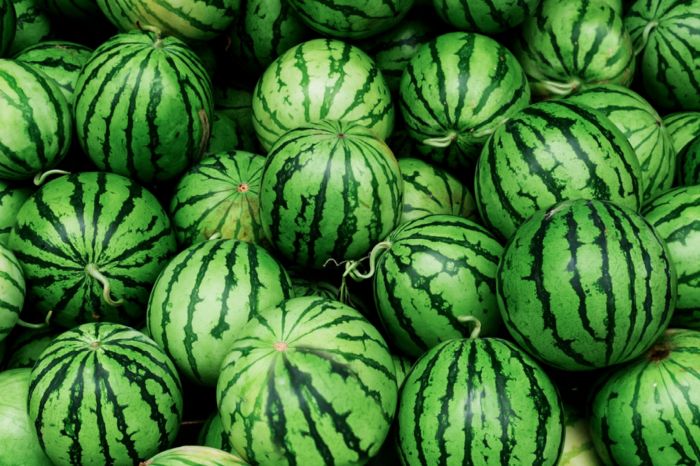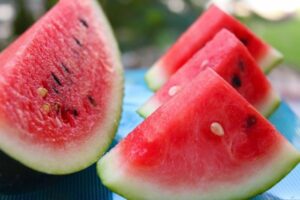How long is watermelon good for? This is a question that many people ask, especially during the summer months when watermelons are in season. Watermelon is a delicious and refreshing fruit, but it is important to know how to store it properly to ensure that it stays fresh and safe to eat.
In this article, we will discuss the shelf life of watermelon, the difference between whole and cut watermelon, the signs of spoilage, and the best storage methods for watermelon. We will also provide some creative ways to use watermelon beyond fresh consumption.
Shelf Life of Watermelon
Watermelon is a refreshing and juicy fruit that is enjoyed by people of all ages. However, like all fruits, watermelon has a limited shelf life. The shelf life of watermelon depends on a number of factors, including the variety of watermelon, the storage conditions, and the ripeness of the fruit.
Generally speaking, watermelon can be stored at room temperature for up to two weeks. However, if the watermelon is cut, it should be stored in the refrigerator for up to three days. Watermelon can also be stored in the freezer for up to six months.
Factors Affecting Shelf Life
The following are some of the factors that affect the shelf life of watermelon:
- Variety of watermelon: Some varieties of watermelon have a longer shelf life than others. For example, seedless watermelons typically have a longer shelf life than watermelons with seeds.
- Storage conditions: Watermelon should be stored in a cool, dark place. Avoid storing watermelon in direct sunlight or in a warm environment.
- Ripeness of the fruit: Ripe watermelon has a shorter shelf life than unripe watermelon. When selecting a watermelon, choose one that is firm and has a deep green rind.
Whole vs. Cut Watermelon
The shelf life of watermelon depends on whether it is whole or cut. Whole watermelons can be stored at room temperature for up to two weeks, while cut watermelon should be refrigerated and consumed within three to four days.
Proper storage techniques are essential to maximize the shelf life of watermelon. Whole watermelons should be stored in a cool, dry place with good air circulation. Cut watermelon should be stored in an airtight container in the refrigerator.
Whole Watermelon
Whole watermelons have a longer shelf life than cut watermelon because the rind protects the flesh from bacteria and moisture loss. To maximize the shelf life of a whole watermelon, store it in a cool, dry place with good air circulation. Avoid storing watermelon in the refrigerator, as this can cause the rind to soften and the flesh to become mealy.
Cut Watermelon, How long is watermelon good for
Cut watermelon has a shorter shelf life than whole watermelon because the flesh is exposed to bacteria and moisture loss. To maximize the shelf life of cut watermelon, store it in an airtight container in the refrigerator. Consume cut watermelon within three to four days for the best flavor and quality.
Signs of Spoilage
Watermelon, a delicious and refreshing fruit, is susceptible to spoilage like any other food item. Identifying the telltale signs of a spoiled watermelon is crucial to avoid potential health risks.
Consuming spoiled watermelon can lead to various health issues, including gastrointestinal distress, nausea, vomiting, and diarrhea. In severe cases, it can even cause food poisoning, resulting in more serious symptoms such as fever, chills, and muscle aches.
Physical Appearance
- Soft or Mushy Exterior: A fresh watermelon should have a firm rind that gives slightly to pressure. If the rind is excessively soft or mushy, it indicates that the watermelon has overripe and is likely spoiled.
- Bruises or Cracks: Bruises or cracks on the watermelon’s rind can provide entry points for bacteria and other microorganisms, leading to spoilage. Avoid watermelons with significant damage to the exterior.
- Mold or Slime: The presence of mold or slime on the watermelon’s surface is a clear indication of spoilage. Discard any watermelon that shows signs of mold or slime.
Smell and Taste
- Sour or Fermented Odor: A fresh watermelon should have a slightly sweet and refreshing aroma. If the watermelon emits a sour or fermented odor, it has likely spoiled.
- Off-Flavor: A spoiled watermelon will have an off-flavor that is sour, bitter, or otherwise unpleasant. Do not consume watermelon that tastes off.
Other Signs
- Hollow Sound: When you tap a fresh watermelon, it should produce a hollow sound. A dull or thudding sound indicates that the watermelon is overripe or spoiled.
- Floating in Water: A fresh watermelon should sink in water. If the watermelon floats, it is a sign that the fruit has lost its density and is likely spoiled.
Storage Methods: How Long Is Watermelon Good For
Storing watermelon properly is crucial to maintain its freshness and quality. Here are the optimal storage methods for whole and cut watermelon:
Whole Watermelon:
- Room Temperature: Store whole watermelon at room temperature (around 70-75°F or 21-24°C) for up to a week. Keep it away from direct sunlight and heat sources.
- Refrigerator: If you want to store the watermelon for longer, refrigerate it. Place it on a shelf, not in the crisper drawer, for up to 3 weeks.
Cut Watermelon:
- Refrigerator: Cut watermelon should be stored in the refrigerator in an airtight container or wrapped tightly in plastic wrap. It will stay fresh for 3-5 days.
- Room Temperature: Cut watermelon can be kept at room temperature for a few hours, but it is best to refrigerate it as soon as possible to prevent spoilage.
Nutritional Benefits
/when-to-harvest-watermelon-2539591-04-f7f99d3a73d846cb9d453f8a6f0cc7ee.jpg?w=700)
Watermelon is a nutritional powerhouse, packed with an array of vitamins, minerals, and antioxidants. Its high water content contributes to its low calorie count, making it an excellent choice for those seeking hydration and nourishment.
The deep red flesh of watermelon is rich in lycopene, a powerful antioxidant linked to numerous health benefits, including reduced risk of heart disease, certain types of cancer, and age-related macular degeneration.
Vitamin C
Watermelon is a significant source of vitamin C, an essential nutrient that supports immune function, collagen production, and wound healing.
Potassium
This refreshing fruit is also high in potassium, an electrolyte that helps regulate blood pressure and maintain fluid balance.
Storage and Nutritional Content
Proper storage conditions are crucial for preserving the nutritional integrity of watermelon. Cutting or slicing the fruit exposes it to air, which can lead to a loss of vitamins and minerals. Whole watermelons stored at room temperature retain their nutritional value for several days, while cut watermelon should be refrigerated and consumed within a few days.
Creative Uses

Watermelon’s versatility extends far beyond fresh consumption. Its refreshing sweetness and juicy texture lend themselves to a myriad of culinary creations.
Savory Delights
Repurpose leftover watermelon into savory dishes that will tantalize your taste buds. Try grilling watermelon slices for a smoky and caramelized flavor, perfect for salads or tacos. For a unique twist, incorporate watermelon into salsas, relishes, or chutneys, adding a burst of freshness and sweetness to your meals.
Sweet Indulgences
Watermelon’s natural sweetness shines in desserts. Puree it into refreshing sorbets or granitas for a light and icy treat. Transform it into flavorful popsicles or ice pops, offering a healthy and guilt-free indulgence. For a sophisticated touch, create watermelon gazpacho, a chilled soup that combines the fruit’s sweetness with savory ingredients like tomatoes, cucumbers, and onions.
Cocktails and Mocktails
Quench your thirst with watermelon-infused cocktails and mocktails. Muddle watermelon chunks with mint and lime for a refreshing mojito. Blend watermelon with vodka, lime juice, and triple sec for a vibrant and fruity cosmopolitan. Non-alcoholic options abound, such as watermelon agua fresca, a refreshing blend of watermelon, lime, and sugar, or watermelon lemonade, a tangy and thirst-quenching treat.
Ending Remarks

Watermelon is a healthy and refreshing fruit that can be enjoyed in many different ways. By following the tips in this article, you can ensure that your watermelon stays fresh and safe to eat for as long as possible.
Expert Answers
How long does watermelon last?
Whole watermelon can last for up to 3 weeks in the refrigerator. Cut watermelon should be stored in an airtight container in the refrigerator and will last for 3-4 days.
What are the signs of spoilage in watermelon?
Some signs of spoilage in watermelon include: a slimy or moldy exterior, a soft or mushy texture, and a sour or off smell.
What are the best ways to store watermelon?
The best way to store watermelon is in the refrigerator. Whole watermelon can be stored on the counter for up to a week, but it should be moved to the refrigerator if it is cut.







Leave a Comment